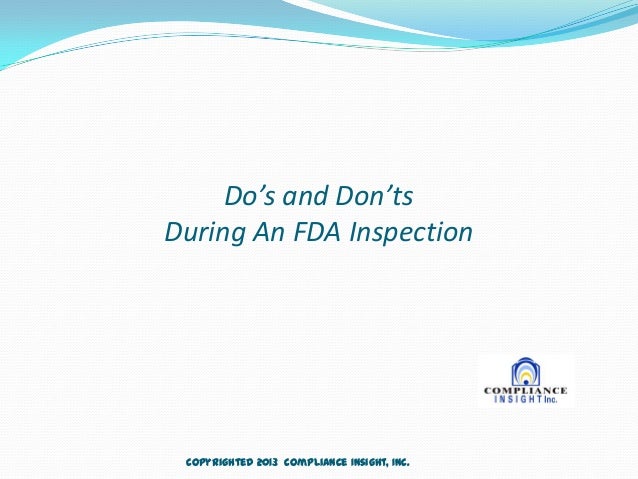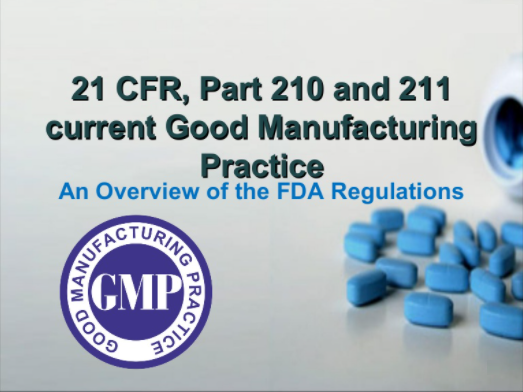USFDA Regulatory Inspection Do’s and Dont’s
FDA Audit – The Do and Don’t List
Pre-inspection Do’s:
• Have a Company Inspection Manual
• Have a trained Company Inspection Team
• Identify what FDA (or the state) may inspect
• Be familiar with relevant sections of FDA’s Investigations Operations Manual.
Company Inspection Manual should include policies on:
o Photographs
o FDA record review
o Complaint file review
o Providing shipping records
o Procedures boundaries (areas and interviews of employees)
o Being accompanied
• Conduct mock inspections periodically
• Review prior inspection reports and check status of any promised corrective action

- When dealing with the FDA investigator,we should demonstrate knowledge of and confidence in our quality system.Not arrogant nor defiant…
- Never give false data, always tell the truth
- Is it OK to say “I don’t know”?
- The investigator may ask the same question to different people at different times
- There are some “tricks”used to pull information from you during the audit
- Be aware of what you are saying and doing
- The “dome of silence”
- The tendency of people to try to fill a void with more information
- Talk, offer more info
- The “Hmmm… factor” Ask a question, write it down, shake your head or get a concerned look
- People take this as a“problem” and then offer more info to fill the gap.
- If the investigator asks you for some information, do not: make them ask for it again, wait to see if they forget about the request
- It is not productive to argue with the investigator when responding to a question or observation* Don’t challenge the investigator. There is no need for that. It only motivates curiosity and questions.
- Do not stand around making faces and looking worried. This makes people feel nervous and may alert the investigator that something may be wrong.* Act confident and proud, not defensive.* If a fellow employee is being questioned, do not try to help them by answering the questions yourself or by giving contradictory information.
- Do not interrupt the investigator or other employees when they are speaking* Do not talk loud or speak with the others when the investigator is trying to concentrate, read or review documentation.* It is not your job to fill an uncomfortable silence with additional explanation.
- Investigator may“read” your body language* Be aware of your body language Things to Remember During an Audit.
- During the inspection,observe and learn to“read” the Investigator’s body language.Things to Remember During an Audit. Verbal -7%, Para-linguistic -38%, Non-Verbal -55% Communication.
- Establish the “normal” behavior patterns So that you are aware of behavioral changes Interview Techniques.
- Upright* Open & Relaxed* Lean forward on occasion* Aligned with Investigator* Casual Posture Change Truthful Posture .
- Retreating* Slouching* Frozen* Not aligned* Barrier Posture* Consistent posture changes* Head & Body Slump Deceptive Posture .
- Stick to the facts not opinions. Do not use phrases such as:I think …I’m not sure but …In my opinion, it should …What you are saying is not true…Honestly… Usually… Typically…As I recall…Things to Remember During an Audit.
- Listen to questions carefully* Answer only what is asked. Do not volunteer information* Clarify what you don’t understand before answering the question* When a question is too broad, ask for specifics Things to Remember During an Audit.
- If you don’t know the answer, say so. It is all right to say that you need to look into the situation further before answering.* Do not guess if you’re not sure of the answer.Look it up in the procedure and or consult you peers, or another SME.* If you are not a SME for a question asked, do not answer the question and explain to FDA this fact and get the right person.Things to Remember During an Audit
- If you think that the investigator has misunderstood something* say so immediately* explain why in a professional manner Things to Remember During an Audit.
- Phrases to Refrain From!* That’s the way we’ve always done it* Off the record…* I probably shouldn’t say this but…* Who, me?* … Uh, no* It’s probably a mistake.
- If we would do it that way we would never get anything done* We don’t have enough time or resources to follow that procedure* I do it a different way because the procedure is not good* If you think that’s bad you should see this…* We fixed that problem by firing the person* That’s not my fault, that was the previous supervisor …* That’s not my problem, that’s Quality Assurance’s problem* Write it on the FDA-483, it’s the only way we can correct it.Phrases to Refrain From.
- Documents and Records The investigator is permitted to review :
- Documents and records pertaining to the control, manufacturing or quality assurance activities within the facility,as required by applicable federal regulations.
- These include (but are not limited to):
- Procedures
- Batch Records
- Regulatory Filings
- Quality Control Procedures
- Validation records
- Calibration/PM records
- Investigations
- Other records such as training records, job descriptions,procedures, promotional labeling etc., as defined in relevant parts of the FDA regulation unless otherwise specified.Documents that can not be reviewed by FDA:
- Reports of audits performed by internal auditors, customers,external auditors or consultants
- Records and documents pertaining to the financial matters of the company (sales data, pricing information, etc.)
- Research data/protocols (true“research” data is exempt from review, product development data can be reviewed by FDA)
- Personnel records other than training
- Management review meeting minutes.
- What happens if an investigator finds something wrong?Answer:
- Discuss concern/finding with investigator so you fully understand what the investigator understands. There should be no mis-conceptions. Ask questions.At the end of each day, we request an oral list of all observations.This gives us an opportunity to address issues before the close of the inspection and allows us to prepare responses to potential 483 observations.
- At the conclusion of the inspection, the investigator presents significant findings at the closing meeting on a FDA 483, List of Observations. If the findings are minor, the investigator may opt to do nothing except verbally advise the Regulatory representative and management of the concerns.
- What happens if an investigator find something wrong?Answer Your firm will respond in writing to the Form 483 with a corrective action plan.
- We have to act quickly but effectively.
- Corrective Action Plan should address specific observations, systemic correction and time frame for implementing corrective actions.
During the Inspection Do’s:
• Notify Inspection Team
• Review credentials and make a copy
• Review FDA 482 – Notice of Inspection
• Review any FDA 482C presented — Request for Records
• Hold opening conference to determine purpose and scope
• Present inspection policies, including facility safety procedures
• Be courteous, professional and firm
• Accompany inspector(s) at all times
• Inspection should be consistent with the stated scope
• Protect trade secrets
• Designated company spokesperson(s) must provide answers “I don’t know” is acceptable, if accurate
• If you are uncertain whether to provide certain requested records or other information, inform the
inspector that you need time to get guidance
• Use company “reporter” to take notes during the inspection
• Collect duplicate samples/swabs/records, but generally do not test products or environmental samples before getting FDA results and evaluating During the Inspection Dont’s
• Keep inspectors waiting
• Sign any documents
• Volunteer information
• Be untruthful or deceptive
• Be intimidated
• Admit any wrongdoing
• Allow inspector to go anywhere unaccompanied
